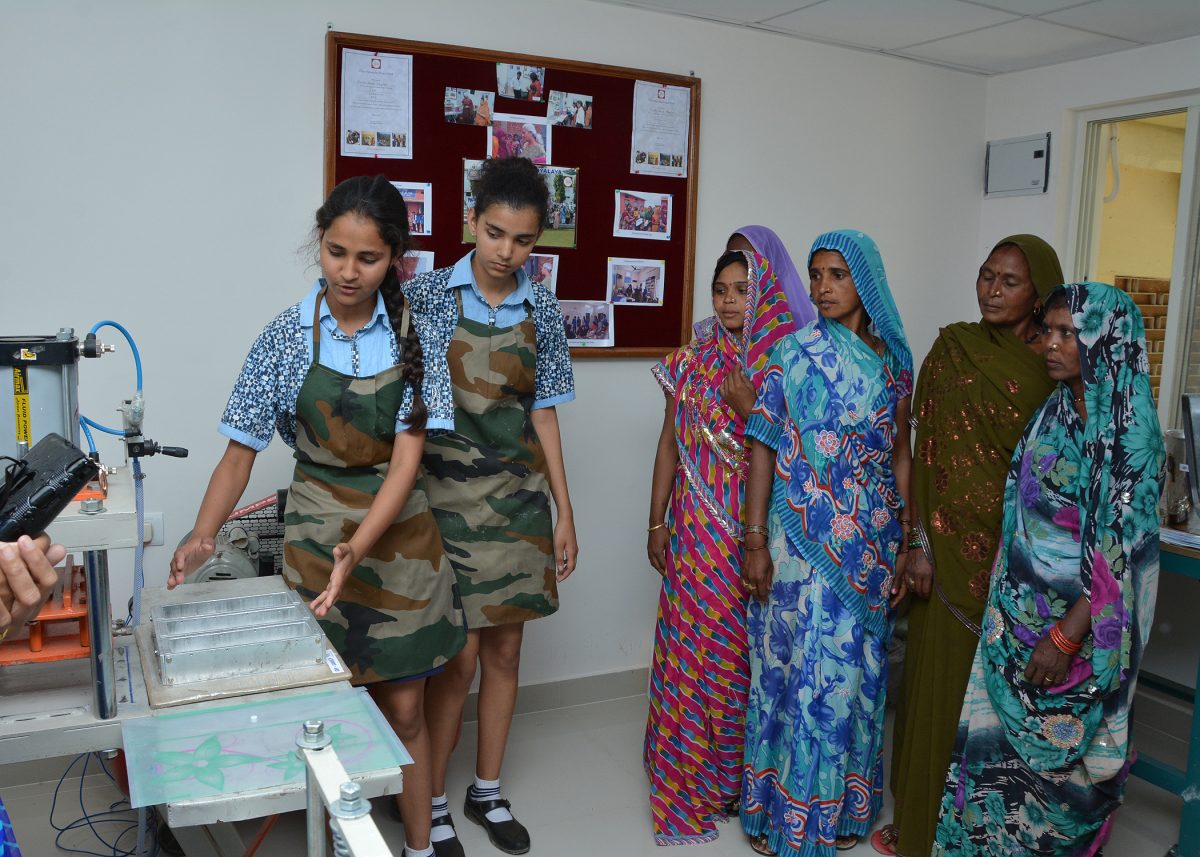Scindia Kanya Vidyalaya’s SANKALP project
Posted: 08 July 2019

IDEALS
- Service
- Leadership
Discoveries
- Communication skills
- Problem solving
- Sense of responsibility
- Tenacity
- Courage
- Self-awareness
- Teamwork
- Compassion
Age range
11-17
Curriculum areas
- Biology – health
- Extra curricula
About
SKV – SANKALP is an initiative by Scindia Kanya Vidyalaya to manufacture low-cost sanitary pads to women in need. The project has helped break taboos, improve standards of women’s hygiene, inculcate gender-sensitization, provide jobs in an entrepreneurial venture, and foster a spirit of service within the school.
The initiative of setting up this unit to produce and distribute sanitary napkins to under privileged women, is named “SKV-Sankalp” – which in Sanskrit means, ‘a resolution taken’ by SKV to help women live with dignity.
Planning
Research:
Over a 15 month period, students conducted research and surveys to identify the potential need for intervention. Their data showed that a large portion of the population of Gwalior live in slums, with no access to basic amenities such as water and sanitation. Students were also able to identify that many women also face challenges accessing sanitary pads: male-run medical stores, un-affordable costs and stigma and shame associated with menstruation.
Stigma around menstruation is a major cause of gender inequality in poor communities. A lack of access to sanitary products and private toilets, and feelings of shame and embarrassment about periods, cause millions of girls and women to miss school and work, raising the risk of them dropping out completely.
Typically, women resort to using alternate sanitary solutions such as old rags, sand, sawdust, leaves and even ash.
Resources: Students applied themselves to finding a way to supply proper sanitary pads to the underprivileged women of one villages. After intense brain storming, they identified a low cost sanitary napkin manufacturing unit where sanitary pads are made from banana fibre and gel cotton which are biodegradable and can be manufactured by students with minimal training. The compact machines are about the size of a student’s study desk.
Funding: Excited at the prospect of this hugely meaningful service, the team set about finding ways to finance their machine and the first consignment of raw material. Funds were raised from funfairs, house sales, contributions from alumni and SA&G Friends of Round Square.
Activity
The product: The process begins with tearing the raw-cotton sheets and mixing with binding cotton in a mixer jar. The material is weighed and 12 grams of material is portioned into moulds which are compressed under an air-powered stamp. After inserting a water-proof strip, this initial napkin is sealed into absorbent tissue-cloth. An adhesive is applied and covered with a strip of oil-paper which can be stripped off to set the napkin in place. A maternity version with longer ‘tails’ is also being manufactured.
At the end of the assembly line, the napkin is sterilised in a UV chamber. Sets of eight napkins are packed together with cling-film and are ready for distribution.
Distribution: The team distributed 250 pads to women in the village of Zagra on the outskirts of Gwalior. Students spent time with the women to educate them about the use and disposal of the napkins.
Due to its low cost many hospitals, NGOs and Missions have approached the school expressed interest in purchasing the student made pads. To meet demand, the commerce students developed a Business Model Summary to recreate the process within the village to be run by local women.
The first unit was set up in Jarga. In 2015, an alumnus studying in London submitted this project to the Davies Peace Projects and received funding of $10,000 to set up a second unit in another village.
Relief work: Pads produced by the students aren’t just benefiting local women, but those in need all across the region
In 2014 students united to make 2000 napkins for women affected by the floods in Kashmir. During the Nepal Earthquake also students sent sanitary napkins along with other relief material. In 2018, when the southern state of Kerala was struck by floods, the school set up work shifts to produce 6000 napkins in 48 hours.
Gender sensitization: Though SKV is an girls school, SKV encourages students of both sexes to perform ‘shramdaan’ (service by labour) and to develop a spirit of servant leadership. Boys and girls of many schools in the country and abroad, sign up for the ‘shramdaan’ during Youth Festivals at SKV.
The Biology teacher imparts a briefing and sensitisation regarding the menstrual cycle of the human female and its implications to both genders.
Challenges
Initially, most of the women of Jarga were very reluctant/hesitant/shy to even attend the sessions we conducted at the village to make them understand the need for menstrual hygiene. The elderly women and some of the men tried to discourage the students from speaking about something that is a taboo in their community.
The women who were too shy in the beginning are now the ones who tell others about the need for maintaining menstrual hygiene. Every time we visited the village, we were warmly welcomed by all. Even the village menfolk have started propagating our message.
Impact
Through this project our students have not only become more compassionate towards those in need, but have also developed a sense of responsibility around ending the cycle of stigma linked to menstruation. It takes courage to raise awareness and to talk about this ‘taboo’ subject, but also tenacity to educate people and to make a lasting change.
Advice
- Encourage your students to find a service project themselves where they can make a real difference;
- Encourage your students to research the need first and then find a powerful solution;
- If any schools would like to help or support us with SANKLAP, you are welcome to contact or visit us.
Author: Nishi Misra, Head of School, Scindia Kanya Vidyalaya Gwalior
